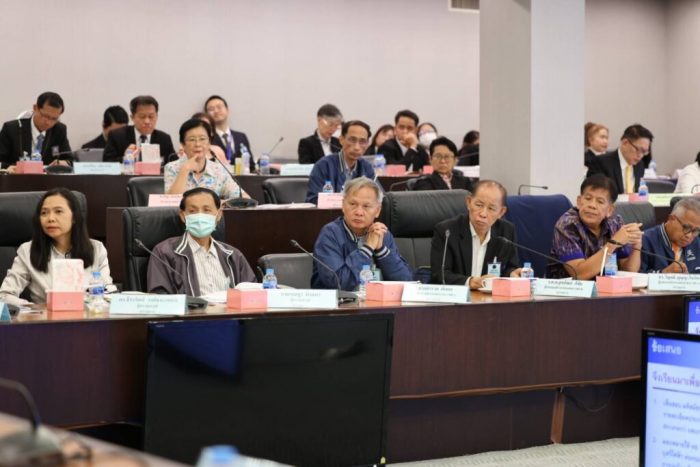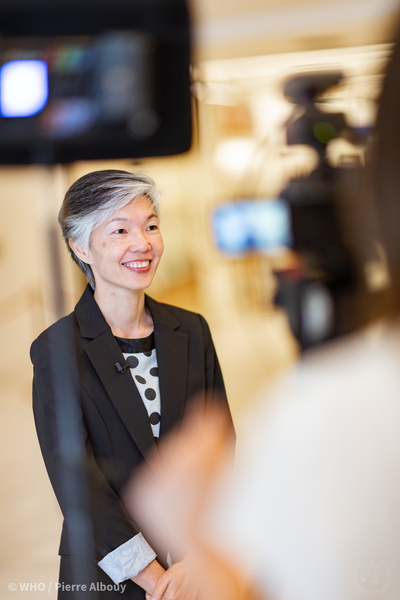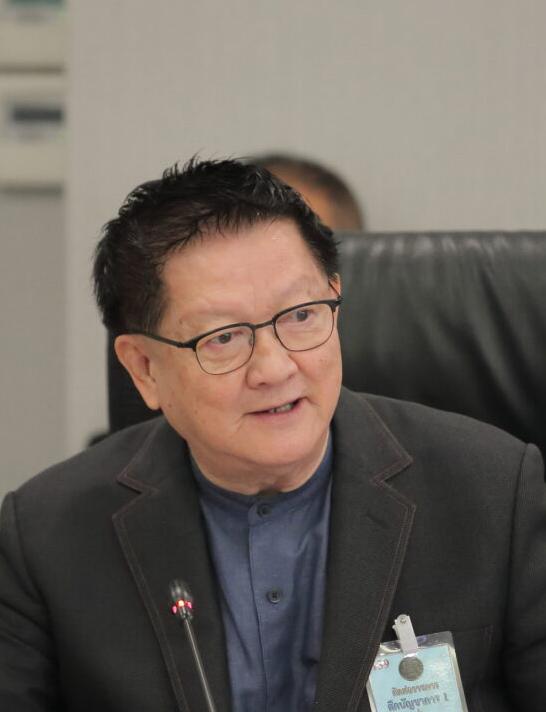
Government urged to back people calls for social participation
Source: https://theactive.net/news/public-policy-20240608/
Photo : NHCO, Thailand and WHO
Edited by: Danielle Thornton and Khanitta Saeiew
The World Health Assembly has officially endorsed a resolution on social participation. The public sector emphasized its effectiveness, acknowledging that while it may take time, the effort is worthwhile. The government should understand the mechanisms involved and be prepared to support this approach. Following its recent adoption at the 77th World Health Assembly in Geneva, Switzerland, the resolution on “Social Participation for UHC, Health and Well-being” has been officially certified.
 The National Health Commission Office (NHCO) presented the results of the resolution certification to the National Health Commission for acknowledgement. The meeting, chaired by Deputy Prime Minister Suriya Jungrungruangkit, included committee representatives from the public sector across 13 regions. It was held at the Government House on June 7, 2024.
The National Health Commission Office (NHCO) presented the results of the resolution certification to the National Health Commission for acknowledgement. The meeting, chaired by Deputy Prime Minister Suriya Jungrungruangkit, included committee representatives from the public sector across 13 regions. It was held at the Government House on June 7, 2024.
This new resolution highlights the importance of public participation in policy-making at all levels. Since the establishment of Thailand’s primary care network, this approach has been pivotal. During the COVID-19 pandemic, the World Health Assembly and member countries noted that nations recovering quickly and managing the crisis effectively implemented strong public participation processes, exemplified by Thailand.
 Nanoot Mathurapote, Head of the Global Collaboration unit at the NHCO, explained the organization’s role in pushing the resolution forward both regionally and nationally. At the end of 2023, their efforts culminated in the World Health Assembly’s certification of the resolution on June 1st, 2024. “Thailand collaborated with Slovenia to spearhead the development of this draft resolution. We conducted consultations with member state countries, addressing their concerns and providing detailed explanations about the resolution’s background and significance. Ultimately, all countries embraced the resolution”, she said.
Nanoot Mathurapote, Head of the Global Collaboration unit at the NHCO, explained the organization’s role in pushing the resolution forward both regionally and nationally. At the end of 2023, their efforts culminated in the World Health Assembly’s certification of the resolution on June 1st, 2024. “Thailand collaborated with Slovenia to spearhead the development of this draft resolution. We conducted consultations with member state countries, addressing their concerns and providing detailed explanations about the resolution’s background and significance. Ultimately, all countries embraced the resolution”, she said.
Kalyathat Dingwang, the ational Health Commissioner and the representative of a private non-profit organization in region 12, as well as President of the Satun Consumers Association, discussed the implementation of social participation processes in her province. She highlighted that such mechanisms have previously been used to advocate for health policies, including the “colorless tea” initiative in Satun Province. This program began with people and public involvement and has successfully developed into a provincial-level collaboration. She emphasized that various issues cannot be left solely to the state. “The public sector or CSO networks must also be enthusiastic and help push forward”, Kalyathat said. She added, “Dark-colored tea is widely popular and a unique identity in our southern region. However, we found that the color used contains carcinogens. Therefore, we campaigned for tea houses to stop adding this substance. We started by engaging with the public and local communities to collect data and pushed the initiative until it became a resolution for Satun Province.”
organization in region 12, as well as President of the Satun Consumers Association, discussed the implementation of social participation processes in her province. She highlighted that such mechanisms have previously been used to advocate for health policies, including the “colorless tea” initiative in Satun Province. This program began with people and public involvement and has successfully developed into a provincial-level collaboration. She emphasized that various issues cannot be left solely to the state. “The public sector or CSO networks must also be enthusiastic and help push forward”, Kalyathat said. She added, “Dark-colored tea is widely popular and a unique identity in our southern region. However, we found that the color used contains carcinogens. Therefore, we campaigned for tea houses to stop adding this substance. We started by engaging with the public and local communities to collect data and pushed the initiative until it became a resolution for Satun Province.”
Kalyathat explained that it took more than three years for Satun province to become the first province to implement a policy on ‘colorless tea’. Awards and colorless tea labels issued by the Ministry of Public Health are now given to compliment tea houses. The Ministry of Public Health also established cooperation with Malaysia, the major tea supplier to Thailand, to request the use of tea coloring that meets safety standards. “At the moment, the neighboring province, Pattani province, has also adopted this model,” Miss Kalyathat g added.
 Meanwhile, Sampan Silapanat, president of the 17th-18th National Health Assembly Organizing Committee, analyzed Thailand’s unique approach to policy-making, highlighting its strengths and limitations. “Foreign countries often recognize Thailand’s distinctive feature: a bottom-up policy-making process that has been well-organized for roughly two decades,” he said.
Meanwhile, Sampan Silapanat, president of the 17th-18th National Health Assembly Organizing Committee, analyzed Thailand’s unique approach to policy-making, highlighting its strengths and limitations. “Foreign countries often recognize Thailand’s distinctive feature: a bottom-up policy-making process that has been well-organized for roughly two decades,” he said.
He stated, however, that this method requires patience due to its time-intensive nature and the need for the application of knowledge. The public sector must be motivated to feel a sense of ownership over the issues, which will lead them to take action. “Ultimately, success hinges on supporting and driving all three sectors – individuals, society, and the legal framework – to work together,” Sampan said.
Following the resolution’s adoption at the 77th World Health Assembly, the NHCO outlined its future action plan:
- Develop a global and national work plans to drive the implementation of the resolution. This plan will involve collaboration with relevant agencies.
- Convene a meeting with international network partners during the upcoming 17th National Health Assembly in November. This meeting will focus on crafting a detailed action plan to move the resolution forward.
To read about the WHA 77 resolution on Social Participation for UHC, Health and Well-being click: https://apps.who.int/gb/ebwha/pdf_files/WHA77/A77_R2-en.pdf
